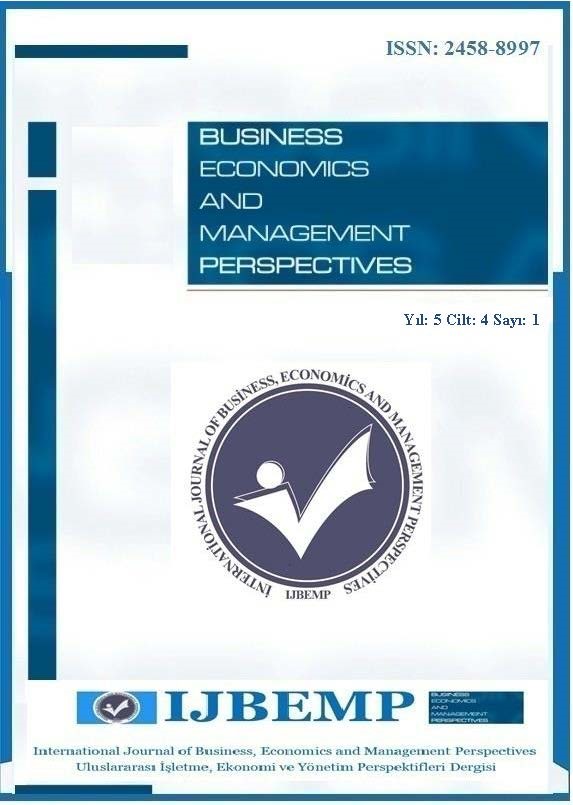MÜŞTERİ SADAKAT PROGRAMLARI KAPSAMINDA IFRS 15 MÜŞTERİ SÖZLEŞMELERİNDEN HASILAT STANDARDININ DEĞERLENDİRİLMESİ
Author :
Abstract
IAS (TMS) 18 Hasılat Standardının çeşitli konularda yetersiz kalması ve karmaşık unsurlu işlemleri açıklamada başarısız olması birçok soruna neden olmuştur. Bu durum yeni bir hasılat standardına ihtiyaç duyulduğunu göstermiştir. Bu amaçla Londra merkezli Uluslararası Muhasebe Standartları Kurulu ve New York merkezli Finansal Muhasebe Standartları Kurulu’nun ortak çalışması ile yeni bir hasılat standardı olan IFRS 15 Müşteri Sözleşmelerinden Hasılat Standardı yayımlanmıştır. Bu standardın yayınlanması ile IAS (TMS) 18 Hasılat standardı ve IFRIC 13 dahil olmak üzere birçok standart ve yorumları yürürlükten kalkmıştır. Çalışmada, müşteri sadakat programlarından doğan hasılatın muhasebeleştirilmesi eski ve yeni hasılat standartları kapsamında değerlendirilmiştir. IFRS 15 hasılatın muhasebeleştirilmesinde önemli bir değişikliğe gitmiştir. Bu değişiklik hasılat yaratıcı işlemlerin sözleşmeye dayandırılması şartıdır. Dolayısıyla sözleşmeye dayalı hasılat ilkesi kavramsal çerçeve ile uyumluluk göstermektedir. Ayrıca standarda göre sözleşmenin karşı tarafı yalnızca müşteri olabilmektedir. Hem IFRIC 13 hem de IFRS 15’de müşteri sadakat programlarından doğan hasılatın muhasebeleştirilmesinde hasılatın ertelenmesini dikkate almaktadır. Başka bir deyişle, hasılatın hediye puan kısmı ertelenir. Ertelenen hasılat, hediye puan müşteri tarafından kullanıldığında veya geçerlilik tarihi dolduğunda muhasebeleştirilir. IFRS 15 Müşteri Sözleşmelerinden Hasılat Standardı, müşteri sadakat programları açısından hasılatın ne zaman ve ne tutarda muhasebeleştirileceğine ilişkin bazı değişiklikler içermektedir.
Keywords
Abstract
The inadequacy of the IAS 18 Revenue Standard on a variety of issues and the failure to explain processes with complex elements caused many problems. This indicates the need for a new revenue standard. To this end, a new revenue standard IFRS 15 Revenue from Contracts with Customers was issued in collaboration with the London-based International Accounting Standards Board and the New York-based Financial Accounting Standards Board. With the publication of this standard, many standards and interpretations, including IAS 18 Revenue Standard and IFRIC 13 Customer Loyalty Programmes, have been abolished. In this study, revenue recognition from customer loyalty programs is evaluated within the scope of old and new revenue standards. IFRS 15 has made a significant change in accounting for revenue. This change is the condition that the revenue-generating processes are contractual. Therefore, the contractual revenue principle complies with the conceptual framework. Furthermore, according to the standard, the opposite side of the contract can only be the customer. Both IFRIC 13 and IFRS 15 take into consideration the postponement of revenue in the recognition of revenue from customer loyalty programs. In other words, the gift point portion of the revenue is postponed. Deferred revenue is recognized when the gift point is used by the customer or expires. IFRS 15 Revenue from Customer Contracts includes some changes when and how much revenue is recognized for customer loyalty programs.
Keywords
- Banasiewicz, A. (2005). Loyalty program planning and analytics. Journal of Consumer Marketing, 22(6), 332-339.
- Chapple, S., Moerman, L., Rudkin, K. (2008). Customer loyalty programmes: IFRIC13 and the ambiguities of revenue recognition, University of Wollongong Research Online.
- Dreze, X., & Nunes, J. C. (2008). Feeling superior: The impact of loyalty program structure on consumers' perceptions of status. Journal of Consumer Research, 35(6), 890-905.
- Grant Thornton. (2014). IFRS News Special Edition on Revenue. Retrieved (12.08.2019) from http://www.gtrus.com/doc/public/gti/gti_ifrs_news_15.pdf
- Köse, T., & Şengül Çelikay, D. (2015). YENİ HASILAT STANDARDI VE GETİRDİĞİ DEĞİŞİKLİKLER. Mali Cozum Dergisi/Financial Analysis, 25(127).
- Leenheer, J., Heerde, Harald J. Van, Bijmolt, T. H.A., Smidts, A. (2007). Do loyalty programs really enhance behavioral loyalty? An empirical analysis accounting for self-selecting members, International Journal of Research in Marketing, 24: 31-47.
- Liu, Y. (2007). The Long-Term Impact of Loyalty Programs on Consumer Purchase Behavior and Loyalty, Journal of Marketing, 71: 19–35.
- O’Malley, L. (1998). Can loyalty schemes really build loyalty?. Marketing intelligence & planning, 16(1), 47-55.
- Raju, Vivek P., (2011), “Accounting for Customer Loyalty Programmes – IFRS Perspective”, The Institute of Chartered Accountants of India (ICAI) Journal, 60(6): 872-876.
- Sacho, Z. Y. (2008). IFRIC 13: How ready are you?, Accountancymagazine.com, February, 80- 81.
- Scott, R. W. (2000). Rewarding Loyaly Among Resellers, Accounting Technology, March, 42-
- Uncles, M. D., Dowling, G. R., & Hammond, K. (2003). Customer loyalty and customer loyalty programs. Journal of consumer marketing, 20(4), 294-316.
- Vardar, G. Ç. (2014). Müşteri Sadakat Programlarının Uluslararası Finansal Raporlama Standartlarına Göre Muhasebeleştirilmesi. Gazi Üniversitesi İktisadi ve İdari Bilimler Fakültesi Dergisi, 15(2), 93-124.
- Zhang J., Breugelmans, E. (2012). The impact of an item-Based loyalty Program on Consumer Purchase Behavior, Journal of Marketing Research, 49: 50-65.
- %20Standartlar%C4%B1/TMSTFRS2016Seti/TFRS_15_09092016.pdf, (Erişim Tarihi: 05.08.2019).
- TMS 18 “Hasılat Standardı” http://kgk.gov.tr/Portalv2Uploads/files/DynamicContentFiles/T%C3%BCrkiye%20Muhasebe%20Stan dartlar%C4%B1/TMSTFRS2011Seti/TMS18.pdf, (Erişim Tarihi: 18.07.2019).
- https://hiltonhonors3.hilton.com/en/terms/index.html , (Erişim Tarihi: 10.06.2019).
- https://www.pwc.com/gx/en/retail-consumer/pdf/ifric_13.pdf , (Erişim Tarihi: 05.04.2019).
- https://www.turkishairlines.com/tr-int/miles-and-smiles/program-ortaklari/index.html, (Erişim Tarihi: 15.06.2019).





